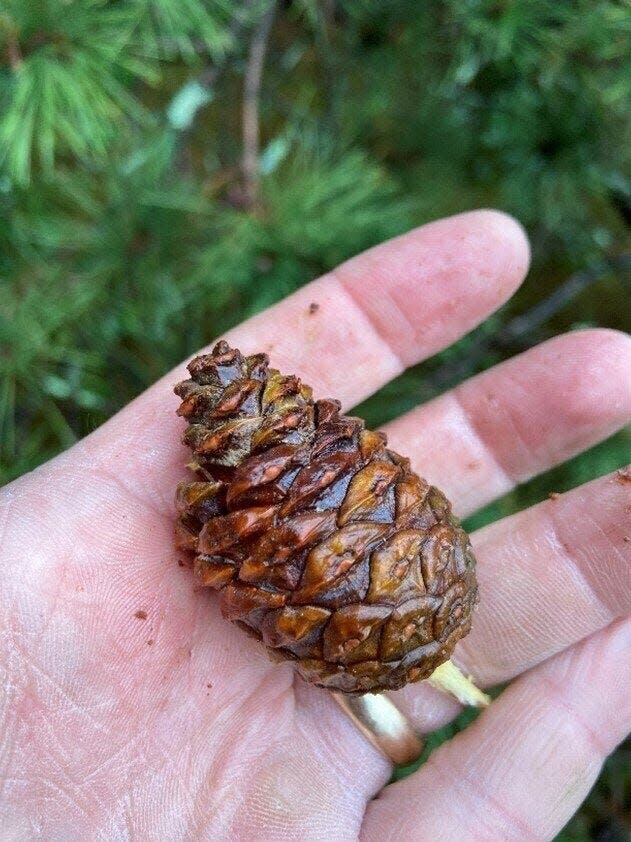The Wisconsin DNR needs red pine cones for reforestation. It will pay you to collect them.
The Wisconsin Department of Natural Resources is going to pay you to collect red pine cones this fall.
According to a DNR news release, the red pine seed collection will go toward the DNR's reforestation program. The tree nursery in Boscobel will sow the remaining red pine seed it has in storage this fall. The public is asked to help resupply that storage.
“The DNR’s supply of red pine seed has been depleted due to the lack of good cone crops over the past couple of years,” said DNR Forest Regeneration Specialist Jeremiah Auer. “Red pine is Wisconsin’s number one conifer for timber production and many red pine plantations are now being harvested as they reach maturity. For sites that will be returned to red pine production, that most likely means planting seedlings for regeneration so help in collecting seed now is vital to ensure the future of this valuable timber resource.”
For those interested in collecting pine cones, here's what you should know.
Where can you find red pine trees in Wisconsin?
Red pine trees can be found all over the state, according to the DNR, especially the sandy soils of central, northwest and northeast Wisconsin.
When is the best time to find red pine cones in Wisconsin?

Early September is "prime time" for collecting red pine cones, the DNR said. That's when they turn from green to purplish brown and reddish-brown tips develop. That's the stage the DNR wants to collect. "When the color has just turned brown but the scales have not yet opened to release the seeds."
Pine cones are at maturity in southern and central Wisconsin and are mostly ready for collection in northern Wisconsin.
What will the DNR pay for a bushel of red pine cones?
The DNR pays $125 per bushel for properly collected red pine cones. A bushel typically nets about a half of a pound of viable seeds. The nursey is looking to purchase more than 120 bushes of pine cones to get enough seed for one year's worth of red pine seedlings.
How to collect according to the DNR
Before collecting cones, contact one of the state nurseries to ensure purchasing is still open.
Griffith Nursery – Wisconsin Rapids, 715-424-3700
Wilson Nursery – Boscobel, 608-375-4123
Hayward Nursery – Hayward, 715-492-1204
All seed must be of natural origin. Trees in your yard are not appropriate for seed harvest.
Seed must be separated and labeled by county of origin.
Cones must be closed. Red pine cones open and close quickly in response to humidity changes but they disperse most of their seed after opening the first time.
Red pine cones are mature when they have turned from green to purplish with red-brown tips. Use clippers to snip these mature, unopened cones at the base of the branch.
Wear gloves so your hands don’t get covered in sap.
Do not mistake Austrian or Scotch pine for red pine. Scotch pine bark is flaky (especially toward the upper part of the stem) and orange and their cones appear twisted and green, even at maturity. Austrian pine tends to be found in urban environments, has a stocky appearance and darker bark compared to red pine. The DNR’s “Forest Trees of Wisconsin” booklet can help collectors identify red pine.
Get permission from the landowner before collecting cones.
How to sell your red pine cone bushels
After collecting, store the cones in a cool, dry area to limit mold growth or cone opening.
Store the cones in breathable containers.
Deliver the cones to one of the DNR buying stations as soon as possible. View buying stations on our Sell Tree Seed webpage.
If there is excess debris mixed in with the cones, they may be rejected or a price reduction applied. The DNR reserves the right to refuse purchase if the cones don’t meet specifications.
Drew Dawson can be reached at ddawson@jrn.com or 262-289-1324.
This article originally appeared on Milwaukee Journal Sentinel: Wisconsin DNR will pay you to collect red pine cones for reforestation
